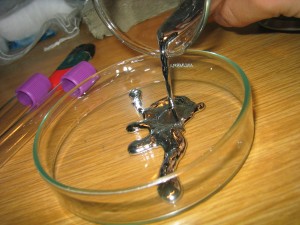
Michigan lawmakers cracking down on mercury in products
Even though only 1 percent of toys contain mercury, Mike Shriberg says that’s too much of the dangerous element in the hands of vulnerable children.
“You’re still talking about millions of products out there,” said Shribert, a children’s health advocate.
The Michigan Network for Children’s Environmental Health, where Shriberg directs policy, is pushing a package of bills in the Michigan Legislature to tighten restrictions on mercury-containing products, including toys.
The bills passed the house last week and were sent to the Senate Committee on Natural Resources and Environmental Affairs.
Michigan and Pennsylvania are the only two Great Lakes states that haven’t banned the sale of mercury-added “novelties,” a term lawmakers use to cover products as diverse as toys, games, shoes and yard statues.
The bills would also ban the sale of mercury switches, devices that use the liquid metal to complete electrical circuits when tilted. The switches were commonly used to turn on lights under car hoods.
All of the Great Lakes states have programs to remove the switches before cars are demolished. But only New York, Minnesota and Illinois have banned their use.
Mercury is a toxic metal that in low doses can harm the developing brains and nervous systems of young children, Shribert said. And it really isn’t needed in products anymore.
Eating fish is the main pathway to human mercury contamination, he said. Though most of the mercury in fish comes from coal-burning power plants, mercury leaking from products like toys and switches in landfills can also contribute.
“While this isn’t going to have some enormous impact, anything we can do to get mercury out of the consumer product chain is absolutely something we should be doing.”
The legislation also requires Michigan to join the Interstate Mercury Education and Reduction Clearinghouse.
The clearinghouse was formed in 2001 to help manufacturers comply with mercury laws, said coordinator Adam Weinert. The group started in the northeastern U.S. and now has 14 member states, including New York, Minnesota and Illinois.
Weinert said the clearinghouse has been working with Michigan legislators to clear up language in the bills.
“We’re pretty actively involved at this point, even though Michigan isn’t a member of the clearinghouse,” he said.
One of the bills would require Michigan manufacturers to label all products that contain mercury, including light bulbs and cosmetics. Big products like cars with several mercury-containing components would list them on one label.
Another bill, which could pass only if the labeling bill also passes, prohibits landfills and waste incinerators from accepting labeled products.
While the Michigan Waste Industries Association supports a mercury ban, it has qualms with how this one would work, said Tom Horton, the association’s vice president.
Limiting the ban to the landfill could be too little, too late, he said.
“If you’re not going to tell businesses or homeowners that you can’t put mercury-containing products in the trash in the first place, what good does it do to ban it at the landfill?”
Though the mercury labels would carry a warning not to throw a product into landfill-destined trash, doing so wouldn’t be illegal.
All of the Great Lakes states have household hazardous waste disposal programs that accept mercury, said Lyman Welch, a water pollution specialist with the Chicago-based conversation group Alliance for the Great Lakes.
Welch said state governments and federal regulators have collaborated on a plan to phase out mercury in products through legislation.
“The regional collaboration is a great way to show that the Great Lakes states are coming together to take these actions,” he said.
This bill must be accompanied by a deposit of some kind, for approved mercury containing products. For example, fluorescent bulbs, which conserve tons of energy, and reduce mercury emissions from coal fired power plants at a level greater than that found in the bulb.
A deposit, would create a program for companies to take the bulbs back, and ensure that people actually recycle them. It’s amazing what a .25 deposit will do.
I hope it goes through. I still believe the combination of the mercury/and other metals to a susceptible child = autism or other neurological disorders. I have personally seen it.
Maybe the epidemic of autistic children would diminish. Interesting to see what happens.